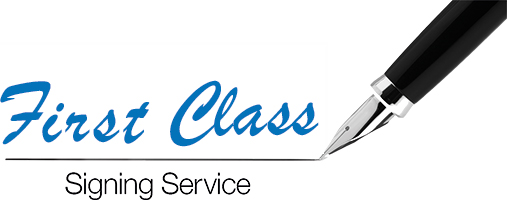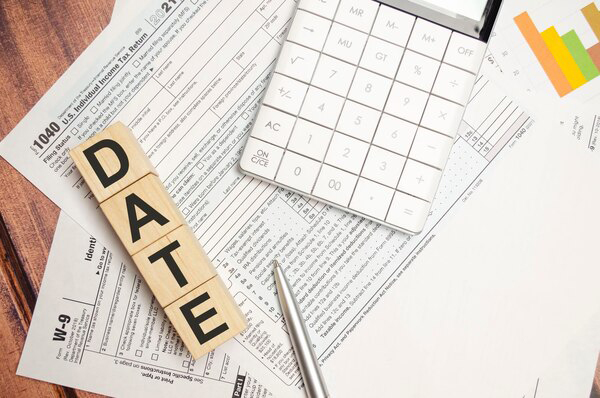When filling out a document for notarization, pay attention to dates. They have more legal weight than you might expect.
At First Class Signing, we regularly help clients navigate these details to avoid costly errors. Two dates are especially important: the document date and the notary date. While they may seem interchangeable, confusing the two could cause delays or even render your document invalid.
So, what is the difference between document date and notary date? Let’s break it down.
What Is the Document Date?
The document date refers to when the document was created or signed by the parties involved. It could be:
- The date the document was drafted
- The day a signer signed it
- The day it takes effect
The document date is determined by the parties and is often based on a legal or business milestone. For example, a contract might take effect at a future date, or a loan agreement might be signed in advance of funds being transferred.
The key takeaway? The document date is set by the signer(s) or relevant parties, not the notary, and may not align with the notarization date.
What Is the Notary Date?
The notary date is the exact date the notary performs the notarization. It must reflect the day the signer physically appears before the notary, whether in person or remotely. This date is written on the notarial certificate and cannot be altered to reflect a previous or future date.
Even if the document was signed days earlier, the notary must list the date the notarization actually occurred. In states where remote online notarization (RON) is allowed, the notary date still reflects the real-time appearance via audio-video technology.
Can the Document Date and Notary Date Be Different?
It depends on the type of notarial act. For example, if a document is signed on Monday but notarized on Wednesday — perfectly legal for acknowledgments — the document date would reflect Monday, while the notary date would reflect Wednesday.
However, for jurats or signature witnessings, the signer must sign in front of the notary, meaning both dates must match.
Why You Should Never Backdate a Notarization
Backdating a notarization (writing a notary date that is earlier than the actual date of the signing) is illegal and can lead to serious penalties. Notaries are only authorized to confirm actions that happen in their presence on the day of notarization. If a document has a pre-filled notary date that’s incorrect, the notary must correct it or attach a new certificate.
Common Mistakes and Legal Risks
Incorrect dates can cause:
- Loan or real estate delays
- Rejected documents by legal or financial institutions
- Questions about document authenticity
- Potential legal consequences for fraud
That’s why working with experienced notaries like those at First Class Signing ensures your documents are handled correctly from the start.
Real-World Scenarios To Watch For
- You signed a document last week but didn’t have it notarized: That’s fine for acknowledgments, but not valid for jurats or signature witnessing.
- You want a future-effective date: The document date can be set in the future, but the notary date still must reflect the real notarization date.
- Multiple signers sign on different days: Each will need their own notary certificate dated correctly.
The Date Difference: Comparing Document Date and Notary Date
| Feature | Document Date | Notary Date |
| What It Represents | When the document was signed or takes effect | When the notary performed the notarization |
| Who Sets It | The signer or parties involved | The notary |
| Flexibility | Can be before or after notarization | Must be the exact date of notarization |
| Location on Document | Near signature line or title | In the notarial certificate |
| Primary Purpose | Shows when agreement or action occurred |
Validates when notarization took place |
Document Types With Date-Specific Requirements
Certain documents are more sensitive to accurate dating:
- Real estate: Errors in real estate notarization dates can invalidate deed transfers.
- Loan paperwork: Lenders may reject documents with inconsistent dates.
- Business agreements: Date discrepancies could delay closings or cause disputes.
- Personal documents: Trusts or powers of attorney must be precise to be honored.
How First Class Signing Ensures Accuracy
Our team works with experienced, certified notaries who know how to avoid common mistakes. Whether you’re scheduling an in-person signing or using our secure remote services, we’ll help make sure your document and notary dates are properly recorded, protecting your transaction every step of the way.
FAQ: Top Questions About Document & Notary Dates
Q: Can the document date be different from the notary date?
A: Only when the notarial act (such as acknowledgments) allows the dates to differ
Q: Is backdating ever legal?
A: No. Notaries must record the actual date of the notarization.
Q: Should I predate my signature before the notary arrives?
A: Only if the notarial act permits prior signing. Otherwise, wait to sign in front of the notary.
Q: Does the notary’s commission expiration date affect my document?
A: As long as the notarization occurs before the commission expires, your document remains valid.
Q: Can digital timestamps replace notary dates?
A: No. Digital timestamps can support recordkeeping but do not replace the official notary date.
Q: What if there’s a dating error?
A: The notary must correct it or issue a new certificate. Never attempt to alter it after the fact.
Ready To Notarize With Confidence?
Need help ensuring your documents are dated and notarized correctly? Schedule a mobile or virtual notary with First Class Signing for secure, accurate and convenient notarization.
Need a Signing Today?
First Class Signing Service’s home office is in Livermore, California, but we pride ourselves on delivering all-in signing solutions to clients nationwide, covering all 50 states and four U.S. territories.
What sets us apart is our exceptional team of 50,000-plus highly qualified signing agents who are dedicated to providing reliable and efficient signing services with utmost care and professionalism.





